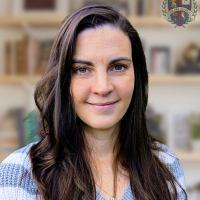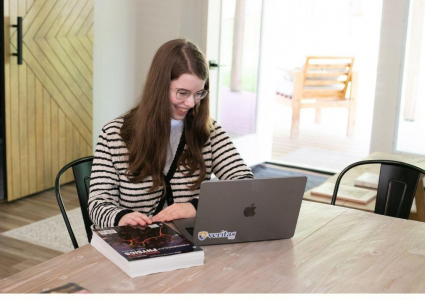The Veritas Press approach to French

French I courses are year-long courses for VSA secondary students.
The Veritas Press approach to Modern Foreign Languages explains why we offer the 4 languages (of 7000 current MFLs) as class options for students.
We recommend students study MFLs after they’ve had Latin and, hopefully, some Greek. Consequently, most Veritas students are taking MFLs in their high school years.
Veritas wants to equip students to exchange ideas with others. When we can communicate in another’s language, we’ve removed a barrier to understanding. If we can do that, we may be able to make the world a little more peaceful place. And that aim is nothing to laugh at.
Read more about the Veritas Approach to Modern Foreign Languages.
What will your child experience in a French I Live Online class? Veritas Scholars Academy (VSA) teacher, Christina Wienckoski describes what material is covered in her classes.
__________
Bonjour et bienvenue à la classe de français I! My name is Madame Wienckoski, and I am one of the French I teachers at Veritas Scholars Academy. This is my fifth year teaching in the online setting, and I enjoy it immensely! I have spent some time studying and teaching in France, and I love sharing my experiences with my students.
Did you know that French is spoken on nearly every continent? Five continents and fifty-three nations, to be exact! French is a key language of international businesses, organizations, culture and tourism: think art, gastronomy, literature, theater, medicine, fashion, dance, technology, and so on. Studying French greatly improves your vocabulary, as a significant percentage of English vocabulary is derived from the French language.
Are you missions-minded? You may not have been aware that there are more French speakers, or francophones, on the continent of Africa than in France itself. In the country of France, less than one percent of the population profess to be born-again Christians, and less than ten percent attend chuch regularly. That is a huge mission field, and only reachable through communication in - you guessed it - French!
In my French class, you can expect to practice the four skills of language acquisition: reading, writing, listening and speaking. During each session, you will be challenged through a range of activities, like listening comprehension activities, short grammar explanation videos, small group dialogues, partner Q & A, whiteboard grammar exercises, cultural comparison discussions, and analyses of authentic French music and texts including simple Bible verses, to name a few. We will focus on real life situations and events, in order to become effective communicators. The chapter themes are well-designed with one purpose in mind: to achieve proficiency in real world interactions, like ordering from a French menu or describing your family, for example. Long lists of unrelated vocabulary in isolation and boring translation exercises are not what define my foreign language classroom. A student-centered classroom experience involving authentic situations is my focus, where my role is that of a facilitator.
In any modern foreign language class, the most successful students are the ones who take risks and do not take themselves too seriously. They ask thoughtful questions and are not afraid to make mistakes or sound like a “fool”. They are engaged and enthusiastic, offering answers and contributing to the class in a wide variety of activities. These students work hard, but do not obsess over perfection. They know that errors are a necessary part of the learning process. Think about a little child who is first learning to speak. They do not hold back; they make a lot of mistakes but do not feel ashamed. So take chances and be a fool! This is how proper language acquisition takes place. In my class, we laugh at ourselves a lot!
Let’s speak the language, not about it. French is a living language, after all. Picture yourself in a large American city. A non-English speaking tourist approaches you and begins conversing in their native language. How would you feel? You would most likely appreciate some imperfect English than none whatsoever. Like you, French speakers will appreciate your effort. Vouloir, c’est pouvoir! Where there’s a will, there’s a way!
__________
The author is Veritas Scholars Academy teacher Christina Wienckoski, who loves to introduce her students to the joys and practicalities of learning French.







